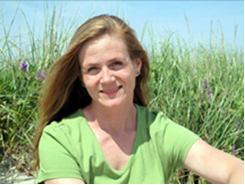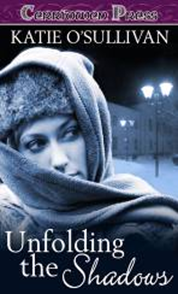
A Kindle Under The Christmas Tree…
by Katie O’Sullivan
I really want an Amazon Kindle this year, wrapped in shiny paper and tied with red satin ribbon. It’s the one that Wired.com called “the best e-reading system on the market.” Or perhaps Santa should stock his sled with the new Sony Readers, or any of the other myriad e-readers on the market today?
As an e-book author, I can make a wish that everyone on Cape Cod gets a Kindle for the holidays (and then buys my e-book, of course!)
But what exactly is an e-reader, anyway? And why should anyone want one?
An “e-reader” is an electronic device you use to read books, magazines and newspapers in digital format. A single e-reader can hold hundreds of books, making packing for that holiday trip to Grandma’s house much easier. E-readers have been around for at least ten years in various forms, but the newest ones are thin, lightweight, and fairly easy to use.

While an e-reader costs much more than one book (the Sony Reader Pocket is about $199 and the Amazon Kindle is about $259), the electronic texts themselves are generally cheaper. The Kindle even comes with free WiFi for downloading texts. Many e-books are available for $10 or less, or even for free. All fiction from before the year 1900 is in the public domain and much of it is available online for free download.
E-books can be uploaded in less than a minute, and many are now available from Amazon at the same time as their hard cover counterparts hit stores. There’s an application to synchronize your Kindle with your iPhone, so you can read on the go without taking the e-reader along.
There are some disadvantages to the electronic format. Reading e-books does require you to purchase some kind of electronic device or software, and the devices aren’t cheap (thus my plea to Santa.) If you’re used to taking books on the run with you, it’s still easier to toss a paperback into your purse than a more fragile e-reader.
Batteries can run out, software can malfunction, the hardware can be damaged, the device can be stolen… these aren’t things you generally have to worry about with paperbacks. Even worse, if your e-reader is stolen, lost, or broken beyond repair, all the e-books stored on the device may be lost. A whole library gone because you spilled your morning coffee!
On the other hand, it does seem to be the way of the future. E-readers aren't typically marketed as environmentally sound, but their environmental impact is now becoming a topic of discussion and research. The production of e-books does not consume paper or ink, using far less in raw materials to produce one e-reader than the hundreds of books it can hold electronically.
One could argue that e-readers aren’t biodegradable in the same way a paperback is. Electronic waste is also a growing problem many tech gadget owners have yet to fully figure out. But some studies are showing that far less carbon emissions result from e-reader manufacturing than from traditional publishing.
According to the New York Times, several U.S. colleges are currently testing the viability of using e-readers for their textbook requirements, citing “sustainability” as a major reason.
What about people who say that e-books aren’t “real” books. Some readers would much rather buy a paperback, and have the feel of paper in their hands than just digital words on a screen.
I’ll admit that while I’m excited to have my first novel published as an e-book, I still dream of walking into my local bookstore someday to host a book signing of paperback novels with my name on them.
I asked other New England-based authors, published in both electronic and print formats, how they feel about e-books. Here are some of their answers.
Multi-published author Ashlyn Chase writes for Ellora’s Cave, Cerridwen Press, Total-e-Bound, and Ravenous Romance. Her books can be purchased as both e-books and traditional paperbacks, and she is an outspoken proponent of e-books. She points out that “e-books can be much edgier and are more apt to surprise you in their originality. Because they are so much cheaper to publish, an e-publisher can take a chance on a new author or even a whole new sub-genre. Traditional publishers publish what they know has sold before and are less open to taking risks.”
Her view is that “some people think e-publishing is only for authors who tried the traditional publishers and were rejected—that e-published authors aren’t good enough to make it onto store shelves. More and more often you’ll find authors that are published in both traditional print and e-format and go back and forth between the two. Some of the books I’ve read online are far better than books I’ve read in print.”
Linda Banche writes Regency romance for The Wild Rose Press, another large e-book publisher. She says, “A book is the content, not the format.” She also points out “e-books aren't going to go away. The technology is there, and it will be used.”
Author Emily Bryan, who also writes as Diana Groe, says “I'm a print author who was really excited when I learned my print titles would also be available as e-books for the Sony Reader the same day the paper books hit the stores.” She believes that “a book is a conversation between the author and the reader. It's an invitation to try on someone else's life for a while. Whether the story is communicated through inkblots on a page or the little 1's and 0's of a download, the exchange of ideas, of experiences is what matters.”
Suspense author Toni Andrews thinks “there is a HUGE advantage to e-books that I seldom see mentioned: They do not go out of print. My first two Mira releases were sold out at the publisher’s warehouse within months, and they have not chosen to reprint. But I am still getting royalties. Thank you, Kindle!”
She adds that “there is a generation that has grown up fully wired, for whom the experience of holding a printed book is less important, and they may never form that sentimental attachment for the printed page or even be aware if their favorite titles come out in print.”
Chatham Young Adult author Marissa Doyle writes for Henry Holt Books, a traditional New York publisher. She disagrees with Toni about her “wired-in generation" assessment.
Doyle says “Children will always feel comfortable with books in their hands because that's how they start out...first with board books, then picture books and early readers. I don't see e-readers replacing those, because (a) small children won't be getting e-readers while they still cost hundreds of dollars, even if they have independently wealthy grandparents and (b) kids' books are about a lot more than the words - they're about the illustrations as well, and I think it will be a long time before an e-reader is developed that can mimic the effect of a two-page spread in a beautifully illustrated picture book. So yes, the coming generation will probably end up "bi-lingual" ...but I don't see e-readers replacing print books in our lifetimes.”
But… I still want a Kindle under my Christmas tree.
Return to the Literary Women page |
 |

Katie O'Sullivan is the Editor and a contributing writer of this magazine. She lives in Harwich with her husband, three children and two large dogs. In addition to reporting and editing, she writes contemporary fiction. Her first suspense novel, "Unfolding the Shadows", was released October 1, 2009 from Cerridwen Press.
Visit Katie at her website or visit her blog

"An enjoyable and entertaining read..an appealing paranormal romance" -
Romance Reviews Today
To order a copy of
Unfolding the Shadows
Please go to www.cerridwenpress.com
E-Books don't exist in just one format. There are several different formats on the market and each needs its own software or reader to read the books with. The software itself can often be downloaded free of charge.
The following file endings are common and usually associated with these types of e-readers:
- .doc files - Microsoft Word, WordPad
- .html files - Internet Browser
- .prc files - Mobipocket
- .kml files - Hiebook
- .lit files - Microsoft Reader
- .rb files - Rocket eBook
- .exe files - Instant eBooks (a web browser is sufficient to read it)
- .pdf files - Adobe's Acrobat Reader
- .rtf files - universal Format, text programs
- .pdb files - Pocket PC, Palm Pilots
- .txt files – Windows, or DOS
To learn more about any of the authors I spoke with for this story, visit their websites
- Visit Emily Bryan at www.emilybryan.com
- Visit Linda Banche at www.lindabanche.com
- Visit Toni Andrews at www.toniandrews.com
- Visit Marissa Doyle at www.marissadoyle.com or read her article in this issue of CWO here.
- Visit Ashlyn Chase at www.ashlynchase.com
Game Changers in the E-Reader Market
- Amazon.com recently reduced the price of the Kindle to $259 for the U.S. version and $279 for its international cousin. It is rumored that the price may drop again before the end of the year (discounted for Christmas), just as other big players are getting into the e-reader game.
- The Barnes and Noble "Nook" e-reader will be available on November 30 for $259. It will have a color touch screen and wireless capabilities and will be able to download magazines & newspapers as well as e-books. Check out a great video at barnesandnoble.com
- Microsoft insists they’re not getting into the e-reader market. They already manufacturer Microsoft Reader, a free, downloadable software application which can be used on PCs. However, an online preview of their new Tablet product looks like it will have e-reader capabilities built in.
- Apple may attempt to take over this fast growing market when it launches its version of the e-reader in January 2010. What the iPod did for music, and the iPhone did for cell phones, Apple is now poised to do for e-readers.